UPSC Daily Current Affairs- 18th April 2024 | Current Affairs & Hindu Analysis: Daily, Weekly & Monthly PDF Download
GS-II
The limitations of Ambedkarite Dalit politics today
Subject: Polity and Governance
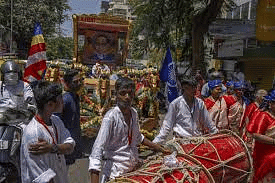
Why in News?
Organising grand events and celebrations in April to commemorate Babasaheb Ambedkar’s birth anniversary has become a national ritual now.
- Ambedkar's Vision for Dalit Political Power: Ambedkar aimed to unite Dalit-Bahujan masses with Adivasis, working classes, and laborers against exploitative systems.
- Historical Significance of Dalit Political Movements: In the mid-1990s, leaders like Kanshi Ram, Mayawati, Prakash Ambedkar, and Ramdas Athawale emerged, shaping Dalit politics.
- Limitations in Dalit politics today:
- Fragmentation in Dalit Political Legacy: Despite unity in commemorations, there's a growing divide in Ambedkar's political legacies.
- Disintegration of Contemporary Ambedkarite Dalit Politics: Lack of visionary leadership and effective strategies has led to segmentation.
- Political Alliances and Vacillations: Dalit parties forming alliances with conflicting ideologies have faced criticism for straying from core principles.
- Way Forward:
- Building Stronger Intra-Dalit Unity: Fostering collaboration among different Dalit factions to create a sense of common purpose.
- Investing in Leadership Development: Nurturing visionary leaders within the Dalit community.
- Strengthening Grassroots Mobilization: Engaging actively with Dalit communities at the grassroots level to build a strong social base.
Who is Wangchuk and Why is he Protesting?
Subject: Polity and Governance
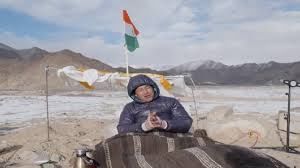
Why in News?
Two days after he announced “Pashmina March 2”, climate activist Sonam Wangchuk has announced to suspended it again.
Who is Sonam Wangchuk?
- Sonam Wangchuk is an Indian engineer, innovator, environmentalist, and education reformist hailing from Ladakh.
- In 1994, he played a key role in initiating Operation New Hope to bring about reforms in the government school system.
- He is the inventor of the Ice Stupa technique, which involves creating cone-shaped ice heaps to store winter water.
- Recipient of the Ramon Magsaysay Award in 2018.
What is the Pashmina March that Wangchuk Wants to Hold?
- The Pashmina March aims to draw attention to the diminishing grazing pastures for shepherds in the Leh region.
- It focuses on the challenges faced by shepherds who traditionally rear Pashmina goats renowned for their valuable wool.
- Main reasons for the pasture loss include land acquisition by corporations and Chinese activities along the LAC.
Why is Sonam Wangchuk Protesting?
- He advocates for Ladakh's inclusion in the Sixth Schedule of the Constitution to safeguard its environment and culture.
- This demand stems from an election promise made by the BJP in 2019.
Other Reasons for the Ladakhis' Protests
- Post the constitutional changes of August 2019, Ladakhis felt a decline in the powers of the autonomous hill development councils.
- There was a shortage of job opportunities after being excluded from the J&K recruitment boards.
- Desire for protection of land, jobs, and culture, along with the aspiration to elect their own representatives as a full state.
Response from the Central Government
- A High-Powered Committee (HPC) was formed by the Ministry of Home Affairs to address the concerns raised by Ladakhis.
- The HPC aimed to safeguard Ladakh's unique culture, language, and geographical importance.
- Its responsibilities included ensuring protection of land, employment, and overall well-being of the people of Ladakh.
China's Economic Growth and its Challenges
Subject: International RelationsSource: International Monetary Fund
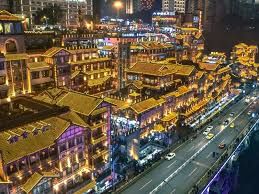
Why in News?
China recently reported a stronger-than-projected economic growth of 5.3% in the January-March 2024 quarter despite facing challenges.
Drivers of China's Economic Growth
- China's National Bureau of Statistics indicates that growth was driven by an expansion in the services sector.
- Upbeat external demand boosted export growth, especially in the industrial sector.
- Government support is evident as China's fixed-asset investment grew by 4.5% in the first three months of 2024, despite weaknesses in February due to the Chinese Lunar New Year holidays disrupting industrial production.
Challenges Faced
- Trade friction with the US, including higher tariffs on Chinese exports.
- Slowdown in some Western European economies, particularly Germany.
- Slowdown in consumption due to investable surplus stuck in real estate, impacting citizens' spending power.
- Troubled property market with declining investment, high debt levels, population aging, slower productivity growth, weaker global demand, increased geo-economic tensions, climate change, and extreme weather events.
Concerns Raised
- The World Bank forecasted China's GDP growth at 5.2% in 2023, slowing to 4.5% in 2024.
- Economists attribute the latest growth trends to a reallocation of investment from troubled real estate to manufacturing, questioning the government's ability to sustain growth momentum.
Impact of China's Economic Growth
- Any uptick in China's growth will have a global impact.
- An above 5% growth for an $18.6 trillion economy is significant, especially considering the historical growth rate of 10% a year in the three decades following the 1978 economic reforms.
- If the property sector downturn extends beyond expectations, it could affect consumer sentiment and spending, leading to cascading impacts on suppliers, creditors, local government revenues, and public investment.
Voluntary Code of Ethics for Social Media Platforms
Subject: Polity and Governance
Source: Indian Express

Why in News?
X recently announced that it withheld four posts by various political parties until Lok Sabha elections on the orders of Election Commission of India (ECI) as it had agreed to 'Voluntary Code of Ethics' for Social Media Platforms (SMP).
Rules for Post Removal
- EC cited provisions of Model Code of Conduct (MCC) against criticism of political parties and private lives of candidates based on unverified allegations.
- EC's March 1 advisory warned political parties to follow MCC during the campaigning period.
Emergence of Voluntary Ethics Code
- In 2019, EC set up a committee under Deputy Election Commissioner Umesh Sinha to address social media use by political parties.
- Changes to the Representation of People Act (RPA), 1951, were suggested to cover social media posts in the 48-hour period before polling.
- Internet and Mobile Association of India (IAMAI) and SMPs presented a 'Voluntary Code of Ethics for General Election 2019' which was adopted and extended to all future elections.
About the Code
- Platforms are directed to undertake awareness campaigns about elections and laws.
- They must create a grievance redressal channel for EC-reported cases.
- Platforms should acknowledge and act on legal orders within three hours for violations under section 126 of RPA, 1951.
X's Reaction
- X disagreed with takedown requests, advocating for freedom of expression in political speech.
- It made EC's emails public and requested EC to publish all future takedown orders.
GS-III
Operation Jumbo to Capture Wild ElephantsSubject: Environment and Ecology
Source: Deccan Herald
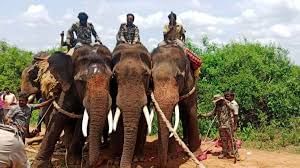
Why in News?
The Forest Department has restarted Operation Jumbo in the Hassan division of Karnataka to capture troublesome wild elephants and equip them with radio collars.
What is Operation Jumbo?
- Operation Jumbo is an initiative by the Karnataka government aimed at capturing and tagging rogue wild elephants that frequently intrude into human settlements.
- It is operational in five districts of Karnataka: Hassan, Chikkamagaluru, Kodagu, Ramanagara, and Bengaluru.
- The primary goal is to regulate elephant movements and reduce conflicts by continuously monitoring them using GPS-enabled radio collars lasting three years.
Implementation of Operation Jumbo
- The expenditure to capture and tag each wild elephant stands at around Rs 22 lakh, with Rs 7 lakh allocated for each radio collar imported from South Africa.
- The operation involves a diverse workforce of 70-80 members, including forest officials, veterinarians, mahouts, and supporting personnel.
- Tasks include surveillance, tracking, tranquilizing wild animals from trained elephants, and ensuring the safety of the rescued tusker.
 |
Download the notes
UPSC Daily Current Affairs- 18th April 2024
|
Download as PDF |
India's Heat Action Plans
Subject: Environment and Ecology
Source: The Hindu
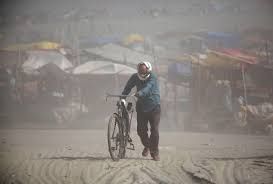
Why in News?
Every summer, we're used to getting heat alerts from the India Meteorological Department (IMD) for different parts of India. But this year, the alerts started as early as February.
A heat wave refers to a period of unusually high temperatures, surpassing the normal maximum temperature.
- In India, heat waves are typically experienced from March to June, sometimes extending into July.
- On average, the northern regions of India witness around five to six heat wave events annually.
- A heat wave is defined as when the maximum temperature reaches at least 40°C for Plains and 30°C for Hilly regions.
- There are different categories based on the departure from normal and actual maximum temperature to classify the severity of heat waves.
- Rapid temperature increases can lead to various health issues like heat cramps, heat exhaustion, heatstroke, and hyperthermia.
Heat Action Plans (HAPs)
- Heat action plans are strategies developed by governments at different levels (State, district, and city) to mitigate the adverse effects of extreme heat.
- These plans focus on preparedness and response measures to combat heatwaves effectively.
- As of now, at least 23 heat action plans exist at the State and city levels, with some States like Odisha and Maharashtra having district-level plans.
Implementation of HAPs
- HAPs typically include a regional heat profile, past heatwave events, vulnerability assessments, and response strategies.
- They identify areas needing immediate attention and present plans for mitigating heatwave impacts before, during, and after occurrences.
- Roles and responsibilities of various departments are outlined, such as disaster management, healthcare, and law enforcement.
Recommendations by HAPs
- Use of forecasts and early warning systems to alert the public and authorities about impending heatwaves.
- Educational campaigns to raise awareness about heatwave risks among the population.
- Establishment of heat shelters, cooling centers, and provision of clean drinking water to prevent dehydration.
- Ensuring hospitals are well-equipped to handle heat-related illnesses and a surge in patients during heatwaves.
Challenges in HAPs Implementation
- Determining heatwaves at local levels like States, districts, and cities due to varying thresholds.
- Inconsistent methods in conducting vulnerability assessments across different HAPs.
- Need for targeted interventions catering to the specific needs of vulnerable populations.
- Uneven allocation of resources impacting the effective implementation of HAPs.
- Lack of integration of HAPs with broader urban resilience and climate adaptation plans.
Conclusion
For heat action plans to be more effective, emphasis should be placed on incorporating nature-based solutions alongside infrastructure development to combat extreme heat in vulnerable areas.
KAVACH Anti-Collision System
Subject: Economics
Source: The Hindu
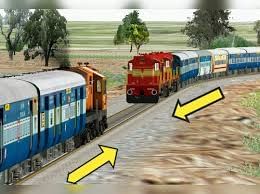
Why in News?
The Supreme Court has recognized and commended the implementation of the indigenous anti-collision system KAVACH.
What is KAVACH?
- KAVACH, previously known as Train Collision Avoidance System (TCAS), is an automatic train protection (ATP) system.
- Development of KAVACH began in 2011 when Indian Railways and Research Designs & Standards Organisation (RDSO) aimed for a locally developed ATP system.
- B. Rajaram, known for developing the Skybus Metro system, played a crucial role in the development of KAVACH.
- Field trials for KAVACH started in 2014 to enhance the system's specifications.
- In 2019, final approval was granted certifying KAVACH for Safety Integrity Level 4 (SIL-4) operations.
Working Mechanism
- KAVACH consists of trackside Radio Frequency Identification (RFID) tags, onboard locomotive equipment, and radio infrastructure.
- Communication occurs via radio, facilitating real-time train monitoring.
- Drivers receive alerts, and automatic braking is activated to prevent collisions.
- Various data inputs such as location, direction, and time are utilized by KAVACH to ensure safety.
- Event recorders store information on interactions and incidents for analysis.
- Alerts and automatic braking mechanisms guarantee an immediate response to hazardous situations.
How does it help prevent collision?
- KAVACH notifies the locomotive pilot if they miss a 'red signal' and continue at a speed surpassing the signal.
- If the pilot fails to reduce speed below 15 kmph, KAVACH automatically applies brakes, stopping the train.
Issues with KAVACH
- High Deployment Cost: Implementing KAVACH costs ₹50 lakh per kilometer for the Indian Railways.
- Low Coverage: Presently, KAVACH covers only 1,500 kilometers of rail routes, a small portion of the total 68,000-kilometer network (as of November 2023).
- Expanding coverage, especially on high-density routes, poses a significant challenge.
Special Rupee Vostro Account (SRVA)
Subject: Economy
Source: Financial Express
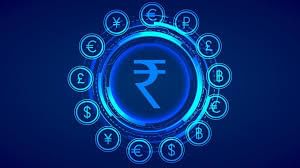
Why in News?
India has simplified the payment mechanism for traders importing pulses from Myanmar, requiring them to use the Rupee/Kyat direct payment system through the Special Rupee Vostro Account (SRVA) via the Punjab National Bank.
International Transactions Settlement Mechanism:
- Vostro Accounts:
- Named from the Latin word "vostro," meaning "yours."
- Represents a domestic bank's account held by a foreign bank in the local currency (e.g., INR in India).
- Allows foreign banks to manage local currency transactions on behalf of their clients.
- For example, a foreign bank holding an account in an Indian bank in Indian Rupees (INR) for facilitating transactions within India.
- Nostro Accounts:
- Derived from the Latin word "nostro," meaning "ours."
- Refers to a foreign bank's account held by a domestic bank in the foreign currency (e.g., USD in the United States).
- Enables domestic banks to handle foreign currency transactions for their clients.
- For instance, an Indian bank holding an account in a U.S. bank in U.S. Dollars (USD) to facilitate international transactions in the U.S. currency.
- Loro Accounts:
- From the Italian word "loro," meaning "their."
- Represents an account held by one foreign bank in another foreign bank's currency.
- Facilitates interbank transactions between two foreign banks without converting currencies into a domestic currency.
- For example, if a bank in India holds an account in a bank in the United States in USD (U.S. Dollars) to facilitate transactions between those two banks.
How are the SRVA different from the already existing Rupee Vostro Account?
The settlement of international trade through Indian Rupees (INR) is an additional arrangement to the existing system of settlement.
SRVA requires prior approval (of RBI) before opening, unlike the Rupee Vostro account.
|
39 videos|4566 docs|979 tests
|
FAQs on UPSC Daily Current Affairs- 18th April 2024 - Current Affairs & Hindu Analysis: Daily, Weekly & Monthly
| 1. Who is Dr. B.R. Ambedkar and what is the significance of Ambedkarite Dalit politics? |  |
| 2. What are the limitations of Ambedkarite Dalit politics in contemporary society? |  |
| 3. Why is Wangchuk protesting and what are the key issues he is raising? |  |
| 4. What are the challenges faced by China in sustaining its economic growth? |  |
| 5. How does the Voluntary Code of Ethics for Social Media Platforms aim to regulate online content? |  |

































